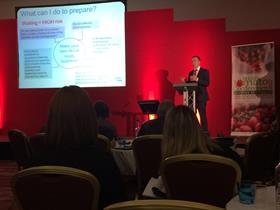
Labour costs in the produce industry could rise by up to 50 per cent after Brexit if businesses have to incentivise workers from other industries, the AHDB has said.
Speaking at the British Tomato Conference, AHDB head of strategic insight David Swales gave delegates a sneak peak at a new project looking at the possible Brexit scenarios for agriculture and horticulture.
Possible solutions to the labour crisis that would unfold if British firms were blocked from accessing EU labour include a new seasonal workers scheme; increasing existing labour productivity; investing in automation; or increasing incentives for unemployed or workers from other sectors, he said.
Discussing the key impacts of Brexit on the produce industry, Swales said labour poses the highest risk, but the possibility of new trade tariffs is also a concern.
“The UK does not wish to be a member of the Single Market. But it also seeks an ambitious Free Trade Agreement with the EU. There’s a real conflict there,” he said, “as the EU views the principals of freedom [trade and people] as indivisible.”
“For third countries importing into the EU there are high tariff charges that vary across products. Fruit and veg have some of the lower import tariffs in food, but on tomatoes on average an import tariff would be about 14 per cent.
“We think the most likely outcome is that the UK will keep the same tariffs as the EU has for external countries, at least to start with. This could well be an opportunity for domestic producers.
“In pretty much all Brexit scenarios, the higher cost of imports will help raise wholesale tomato prices, which I guess is some good news.”
Swales said three possible wholesale price increases for tomatoes once the UK leaves the EU are five per cent (if the UK succeeds in gaining a FTA with the EU), eight per cent (no UK import tariffs but no FTA), or 20 per cent (no FTA and all existing WTO tariffs).
The figures echo recent data from the British Retail Consortium that said that tomato and broccoli prices were among those that could jump by up to 20 per cent.
On the government’s strategy for a possible new British agriculture model, once CAP payments from the EU end post-2019, Swales said the government is “looking around the world for inspiration”.
“The countries they are looking at, the US, Canada, Australia and New Zealand, typically have less government support for agriculture than we currently enjoy,” he said.
The opportunity to relax or adapt some plant protection regulations has prompted optimism in the industry, Swales said, but said this is unlikely to happen at least in the medium term as the UK will seek to preserve its reputation for high environmental and safety standards while negotiating new global trade deals.
Swales warned delegates against “waiting to see” what Brexit would bring, and instead advocated early preparation with the information that is available.
“We do know quite a few of the issues around Brexit now. Coming up with some plans now will mean you will be better prepared when it does happen,” he said.



